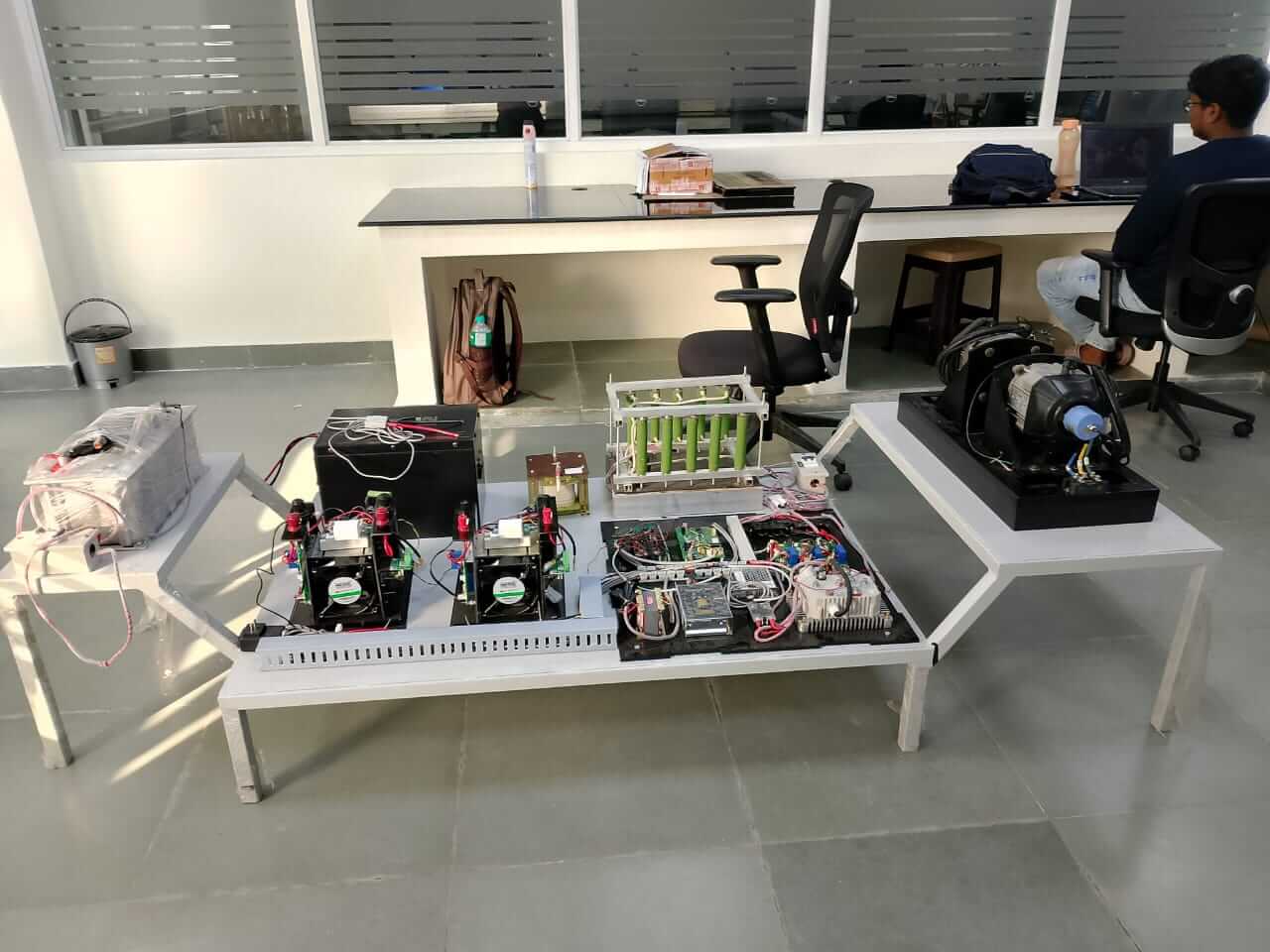Advancing Hydrogen-Powered Mobility Through Innovation
Ecosense proudly announces the successful installation of its Fuel Cell Drive Train System at the Work Integrated Learning Program (WILP), BITS Hyderabad. This milestone strengthens research and education in hydrogen-based mobility, enabling students and researchers to explore fuel cell technology, hybrid energy storage, and electric vehicle (EV) drive systems. As the world transitions to clean and sustainable transportation solutions, the need for advanced educational infrastructure in green energy technologies has never been more critical.
The Fuel Cell Drive Train System provides students and researchers at BITS Hyderabad with an interactive and real-time learning environment, allowing them to analyze the integration of fuel cells, batteries, and supercapacitors in an EV drivetrain. This system not only bridges the gap between theoretical learning and practical application but also enables the exploration of energy efficiency, power conversion, and performance optimization in electric mobility.
Understanding the Fuel Cell Drive Train System
The Fuel Cell Drive Train System is an advanced energy management framework that integrates multiple energy sources for efficient power delivery. It comprises:
• Fuel Cell Stack – Converts hydrogen into electricity through an electrochemical reaction, producing only water and heat as by-products, making it a zero-emission energy source.
• Battery Bank (72V, 24Ah) – Acts as the primary energy storage unit, supplying power when needed and ensuring a stable voltage supply.
• Supercapacitor (48V, 165F) – Provides rapid charge and discharge capabilities, ensuring peak power support and reducing stress on the battery.
• PMSM Traction Motor (1kW, 1500 RPM) – Drives the electric vehicle system, simulating real-world EV performance.
• Loading Motor with Resistive Load (1kW) – Simulates various driving conditions, allowing researchers to test efficiency under different load scenarios.
• Power Electronics (Boost & Bidirectional Converters) – Ensures efficient energy transfer between fuel cell, battery, and supercapacitor.
• MATLAB-Based Control System – Provides a software-controlled interface for energy flow management and optimization.
This system offers an ideal platform for testing and validating power electronics, energy storage strategies, and drivetrain efficiency in hydrogen fuel cell vehicles.
Key Features of the Fuel Cell Drive Train at BITS Hyderabad
The Fuel Cell Drive Train System is designed to provide a real-world simulation of hydrogen-powered electric vehicles, with features such as:
• Hydrogen-Powered Electric Drive – Uses a fuel cell as the primary energy source, enabling zero-emission mobility.
• MATLAB-Based Control & Monitoring – Allows real-time simulation, control, and optimization of power flow.
• Battery and Supercapacitor Hybrid Energy Storage – Enables efficient energy storage and peak power management.
• Bidirectional Energy Flow – Supports regenerative braking and energy recovery, reducing energy wastage.
• Traction & Loading Motor Setup – Simulates real-world acceleration, braking, and road conditions for vehicle performance analysis.
• Microgrid and Grid Connectivity – Supports integration into hybrid energy systems, facilitating advanced research in smart grids.
• Open-Source Architecture – Researchers can modify control algorithms and conduct customized studies on energy efficiency and system performance.
Applications in Research and Industry
The Fuel Cell Drive Train System provides a robust testing and research platform for:
• Fuel Cell-Based EV Development – Studying energy distribution and efficiency in hydrogen-powered electric vehicles.
• Battery & Supercapacitor Energy Studies – Exploring fast charging, peak load handling, and hybrid energy management.
• Power Electronics & Control Algorithms – Developing and testing boost converters, MPPT techniques, and advanced control strategies.
• Hydrogen Economy & Renewable Integration – Researching hydrogen fuel storage, distribution, and integration with solar/wind power.
• Grid Interaction & Microgrid Studies – Investigating renewable energy integration into power grids and load balancing mechanisms.
The system also serves as a training platform for future engineers and researchers who will contribute to the global transition towards sustainable transportation solutions.
Hands-On Training & Demonstration at BITS Hyderabad
Following the installation, Ecosense conducted an extensive training and demonstration session for faculty and students at BITS Hyderabad. The session covered:
• Fuel Cell and Hydrogen Power Basics – Introduction to fuel cell technology, hydrogen storage, and safety protocols.
• System Operation & MATLAB-Based Control – Hands-on training in monitoring and controlling the drive train system.
• Energy Flow & Efficiency Analysis – Understanding how power flows between fuel cell, battery, and supercapacitor under different conditions.
• Power Electronics & Boost Converters – Insights into DC-DC conversion, energy optimization, and regenerative braking strategies.
• Simulation and Performance Testing – Live demonstrations of real-time vehicle performance simulation and load testing.
• Q&A Session for Research & Innovation Opportunities – Interactive discussions on how students can leverage this platform for advanced research.
The training ensured that students and faculty members fully understand the system's capabilities and can utilize it effectively for research, innovation, and industrial applications.

Ecosense Installs Fuel Cell Drive Train at WILP, BITS Hyderabad
Shaping the Future of Sustainable Mobility
The installation of the Fuel Cell Drive Train System at WILP, BITS Hyderabad, marks a significant step toward the future of clean mobility and sustainable transportation. Hydrogen fuel cell technology is poised to revolutionize the automotive industry, providing high efficiency, fast refueling, and zero emissions. By equipping students and researchers with state-of-the-art technology and hands-on learning experiences, Ecosense is fostering the next generation of engineers and scientists who will drive innovation in green energy and transportation.
With this installation, BITS Hyderabad is now positioned as a leader in hydrogen-powered vehicle research, enabling:
• Development of next-generation fuel cell electric vehicles (FCEVs)
• Innovations in energy storage, power electronics, and hybrid systems
• Cutting-edge research in hydrogen economy and renewable integration
• Industry collaboration for commercializing sustainable mobility solutions
By bridging academic research with industry needs, this collaboration between Ecosense and BITS Hyderabad is setting a benchmark for excellence in renewable energy education. Together, we are building a cleaner, greener, and more sustainable future for transportation and energy systems worldwide.
